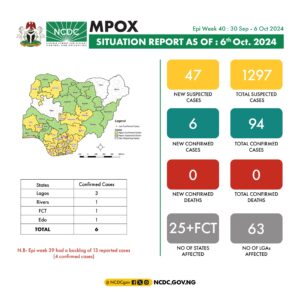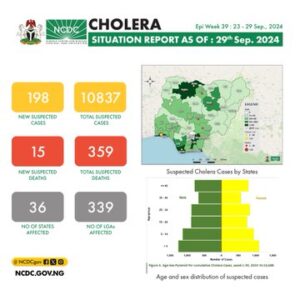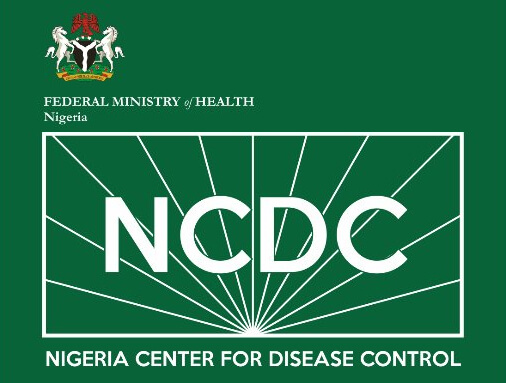Cholera, Mpox Cases Surge in Nigeria, NCDC Warns Citizens
The Nigeria Centre for Disease Control and Prevention has reported 14,237 cases of cholera across 35 states, including the Federal Capital Territory
Dr Jide Idris, NCDC Director General, announced during a press briefing in Abuja on Thursday that 378 deaths have been attributed to cholera. He also revealed that confirmed Mpox cases in the country have risen to 102, spanning 26 states and the Federal Capital Territory, up from the previous total The Nigeria Centre for Disease Control and Prevention has reported 14,237 cases of cholera across 35 states, including.
Federal Capital Territory, affecting 339 local government areas as of October 13, 2024.
Dr Jide Idris, NCDC Director General, announced during a press briefing in Abuja on Thursday that 378 deaths have been attributed to cholera. He also revealed that confirmed Mpox cases in the country have risen to 102, spanning 26 states and the Federal Capital Territory, up from the previous total 94.
Idris emphasised that cholera remains a significant public health concern, particularly in areas with poor water, sanitation, and hygiene systems. He added that the centre is working with stakeholders to control the spread.
He said, “As of October 13, 2024, a total of 14,237 cases of cholera have been reported across 35 states and the FCT, spanning 339 local government areas.
“Sadly, 378 lives have been lost, resulting in a case-fatality ratio of about 2.7 percent. The burden of this outbreak disproportionately affects the most vulnerable—children under the age of five.
“This year has seen two significant waves of cholera, with the most recent surge reported during the week of September 29, attributed to the heavy rains and subsequent flooding.
“This is a pattern we anticipated, having foreseen the risks through data and advisories provided by the Nigerian Meteorological Agency.
“The floods in the northern states such as Borno, Adamawa, Jigawa, Yobe, and Kano have exacerbated the spread of cholera, making these states the current epicentres of the outbreak.
“Earlier in the year, the cholera cases were concentrated in southern states as the rains began there, but we have seen a shift, with northern states now accounting for a significant portion of cases.
“The number of suspected cholera cases and deaths in 2024 has more than doubled when compared to this time last year.
“These numbers reflect the severity of the outbreak and reinforce the need for continuous vigilance and action.
“It also underscores the developmental issues that should be addressed both at the national and sub-national levels with improved commitment towards addressing challenges relating to inadequate access to clean water, open defecation, poor environmental sanitation, food, and personal hygiene.


He stated that the agency has deployed rapid response teams, including experts from health ministries, to the affected northern states.
Further, he mentioned that high-level advocacy visits, including one to Borno State, were conducted to engage with state health leaders, motivate response teams, and provide support to communities displaced by floods.
He continued, “Our efforts have been bolstered by collaboration with the National Primary Health Care Development Agency.
“Together, we have successfully supported our sister agency, the NPCHDA, to carry out reactive cholera vaccinations in internally displaced persons camps, a move that has proven crucial in the reduction in cases being reported.
“We urge all Nigerians to practice good personal, food, and environmental hygiene, with emphasis on regular hand washing with soap and water under running water, and to seek medical care immediately if cholera symptoms—such as severe diarrhoea and vomiting—occur.
“Looking ahead, our priorities remain clear—we will continue to enhance surveillance, improve prompt treatment of affected persons, and strengthen water sanitation and hygiene practices in affected communities. Cholera is a preventable disease, and with collective effort, we can control and eventually eliminate this threat.”
READ: 153 Lives Lost in Majia Tanker Explosion, 100 Injured.
Regarding the case of Mpox, Idris stated that in response to the threat, particularly due to regional cross-border transmission, the NCDC has strengthened its strategy to prevent the spread of the virus.
He stated, “We are primarily dealing with the Clade IIB variant, which has been circulating in Nigeria; however, we are also monitoring the situation in Cameroun, where both Clade IB and IIB are reported, and heightening our surveillance for the Clade IB, a more severe strain currently circulating in Kenya, Uganda, Burundi, and the DRC, which has the potential for rapid spread through community transmission.
“Nigeria has continued to manage the outbreak with vigilance. As of October 13, a total of 102 confirmed cases have been recorded across 26 states and the FCT, from 1,339 suspected cases. Encouragedly, there have been no recorded deaths, but we remain cautious.
“The observed steady rise in the number of reported cases in recent weeks can be attributed to enhanced surveillance and improved case detection across the country.”
He further explained that the agency’s response strategy is built on stakeholder engagement, enhanced surveillance and diagnostic capabilities, community outreach, and a vaccination campaign.
“In partnership with the National Primary Healthcare Development Agency and National Agency for Food and Drug Administration and Control, we are facilitating the deployment of 10,000 doses of the Mpox Jynneos vaccine, prioritising high-risk groups such as contacts of confirmed cases and immunocompromised individuals.
“Priority states for this vaccination campaign include Bayelsa, Rivers, Cross River, and Akwa Ibom, based on the burden of Mpox cases reported since 2017.
“Anyone with a rash illness is advised to visit the nearest health facility for care. The general public is advised to avoid direct contact with sick or dead animals and avoid consumption of undercooked meat.”
f 94.
Idris emphasised that cholera remains a significant public health concern, particularly in areas with poor water, sanitation, and hygiene systems. He added that the centre is working with stakeholders to control the spread.
He said, “As of October 13, 2024, a total of 14,237 cases of cholera have been reported across 35 states and the FCT, spanning 339 local government areas.
“Sadly, 378 lives have been lost, resulting in a case-fatality ratio of about 2.7 per cent. The burden of this outbreak disproportionately affects the most vulnerable—children under the age of five.
“This year has seen two significant waves of cholera, with the most recent surge reported during the week of September 29, attributed to the heavy rains and subsequent flooding.
“This is a pattern we anticipated, having foreseen the risks through data and advisories provided by the Nigerian Meteorological Agency.
“The floods in the northern states such as Borno, Adamawa, Jigawa, Yobe, and Kano have exacerbated the spread of cholera, making these states the current epicentres of the outbreak.
“Earlier in the year, the cholera cases were concentrated in southern states as the rains began there, but we have seen a shift, with northern states now accounting for a significant portion of cases.
“The number of suspected cholera cases and deaths in 2024 has more than doubled when compared to this time last year.
“These numbers reflect the severity of the outbreak and reinforce the need for continuous vigilance and action.
“It also underscores the developmental issues that should be addressed both at the national and sub-national levels with improved commitment towards addressing challenges relating to inadequate access to clean water, open defecation, poor environmental sanitation, food, and personal hygiene.
He stated that the agency has deployed rapid response teams, including experts from health ministries, to the affected northern states.
Also, he also mentioned that high-level advocacy visits, including one to Borno State, were conducted to engage with state health leaders, motivate response teams, and provide support to communities displaced by floods.
He continued, “Our efforts have been bolstered by collaboration with the National Primary Health Care Development Agency.
“Together, we have successfully supported our sister agency, the NPCHDA, to carry out reactive cholera vaccinations in internally displaced persons camps, a move that has proven crucial in the reduction in cases being reported.
“We urge all Nigerians to practice good personal, food, and environmental hygiene, with emphasis on regular hand washing with soap and water under running water, and to seek medical care immediately if cholera symptoms—such as severe diarrhoea and vomiting—occur.
“Looking ahead, our priorities remain clear—we will continue to enhance surveillance, improve prompt treatment of affected persons, and strengthen water sanitation and hygiene practices in affected communities. Cholera is a preventable disease, and with collective effort, we can control and eventually eliminate this threat.”
Regarding the case of Mpox, Idris stated that in response to the threat, particularly due to regional cross-border transmission, the NCDC has strengthened its strategy to prevent the spread of the virus.
He stated, “We are primarily dealing with the Clade IIB variant, which has been circulating in Nigeria; however, we are also monitoring the situation in Cameroun, where both Clade IB and IIB are reported, and heightening our surveillance for the Clade IB, a more severe strain currently circulating in Kenya, Uganda, Burundi, and the DRC, which has the potential for rapid spread through community transmission.
“Nigeria has continued to manage the outbreak with vigilance. As of October 13, a total of 102 confirmed cases have been recorded across 26 states and the FCT, from 1,339 suspected cases. Encouragedly, there have been no recorded deaths, but we remain cautious.
“The observed steady rise in the number of reported cases in recent weeks can be attributed to enhanced surveillance and improved case detection across the country.”
He further explained that the agency’s response strategy is built on stakeholder engagement, enhanced surveillance and diagnostic capabilities, community outreach, and a vaccination campaign.
“In partnership with the National Primary Healthcare Development Agency and National Agency for Food and Drug Administration and Control, we are facilitating the deployment of 10,000 doses of the Mpox Jynneos vaccine, prioritising high-risk groups such as contacts of confirmed cases and immunocompromised individuals.
“Priority states for this vaccination campaign include Bayelsa, Rivers, Cross River, and Akwa Ibom, based on the burden of Mpox cases reported since 2017.
“Anyone with a rash illness is advised to visit the nearest health facility for care. The general public is advised to avoid direct contact with sick or dead animals and avoid consumption of undercooked meat.”
Content Credit| Igbakuma Rita Doom
Picture Credit | https://punchng.com/ncdc-confirms-48-mpox-cases-in-19-states-fct/




